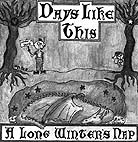








 The tightly harmonizing a cappella voices boldly sing, "Some days will look brighter than others" and today is one of those days. Oberlin's own Days Like This releases its first CD, A Long Winter's Nap today, offering an eclectic collection of 10 tunes to the apathetic, aggravated, angst-ridden and affable.
The tightly harmonizing a cappella voices boldly sing, "Some days will look brighter than others" and today is one of those days. Oberlin's own Days Like This releases its first CD, A Long Winter's Nap today, offering an eclectic collection of 10 tunes to the apathetic, aggravated, angst-ridden and affable.
When I tore the cellophane off my complimentary disc and discovered not one but two jackets, I rejoiced in the discovery that I was in store for something special. My initial listening confirmed the find. The five-member band presents a diverse arrangement of music eager and easy to please the tastes and temperaments of many.
Guitarist Tom Carroll authors and fronts the vocals for four tracks, including a stirring "Close Your Eyes," inspired by and written for singer and guitar-strummer Ben Jones. The soothing, gentle tone, reminiscent of Smashing Pumpkins, is slightly diminished by Carroll's underconfident voice, which does show much strength at other times throughout the album.
The band covers two songs from Jones's solo CD, Turtles, released last year. "Light" acquires a constant harmony, incorporating keen drumming on the part of Adam Rhodes and Matt Mascolo's gentle keyboard with an increase in tempo. Showing the band's tightness and cohesion, "Yet Another Day" highlights some sleek keyboard fingering.
Separating the songs into individual performances, though, could detract from the sum of their parts. The musicians' various influences, backgrounds and personalities culminate in a multifaceted, intriguing, impressive collection. One way the band's success shows is by how infectious the tunes are that "stick to the mouth like peanut butter on the brain," as Alice in Chains would say.
At times the band reaches a fierce plateau of cohesion, during "Piece of Mind," for example. Although Carroll's vocals here sound rather Hootie-esque, each performer gives his all while blending smoothly with the others. At other times attempts at melding fail and parts stand out uncomfortably. During the cynical "Sock," the voices do not quite harmonize and the instruments each vie for recognition, but the wah-wah provides a succulent sound and Mascolo shines brightly.
While Days Like This shoots high and often scores, as it does with "By the Sea," the band does not always attain its complex goals. "Wing" in part expresses Jones's philosophy, "Who cares about the future when the present comes before?" The inventive and tricky keyboard part has an ineffective discord that sounds like a mistake.
Jones employs his clever, cynical wit in the lyrics for "Sock," intoning, "The only thing worse than being within, baby, is being without," but when bassist Joel Fisher seizes a sleek solo from Mascolo, he curiously stops after seven seconds. Occasionally harmonies do not blend as masterfully as at other times, like the length of "Simply Free" throughout which Carroll's and Jones's voices buzz.
The 10-minute long "By the Sea" allows Mascolo to spread his wings and take the listeners on a journey of explanations, images and ambience. The song highlights his talents at playing the keyboard, writing lyrics and setting atmospheres. He takes us to another world, asking, "Couldn't we just hold each other and be hopeful for one night?" later proclaiming that he has felt "what it means to be alive."
Throughout the album, Fisher provides solid backing on bass. He smoothly makes his contributions but unfortunately does not get much time in the spotlight.
Quite skillfully, Rhodes consistently serves up the percussive side of the music, turning numerous impressive tricks.
Either the bandmembers transform into one resolute entity as only successful musicians can, or Days Like This awkwardly exhibits its individual elements. Fortunately and magnificently, the former is by far the greater tendency.
Days Like This does not create music for the masses but for manifold moods and mentalities. Of the 10 songs, some are tender and encouraging, some ironic and insightful, some fanciful and storylike. All are special, exquisite and promising.
Criticism proves relatively useless after several listenings to the disc, when one grows to appreciate the intrepid artistic endeavors. The last line perhaps best describes the total effect: "And I know you'll completely agree, and can find this peace of mind."

Copyright © 1996, The Oberlin Review.
Volume 124, Number 19; April 5, 1996
Contact Review webmaster with suggestions or comments at ocreview@www.oberlin.edu.
Contact Review editorial staff at oreview@oberlin.edu.